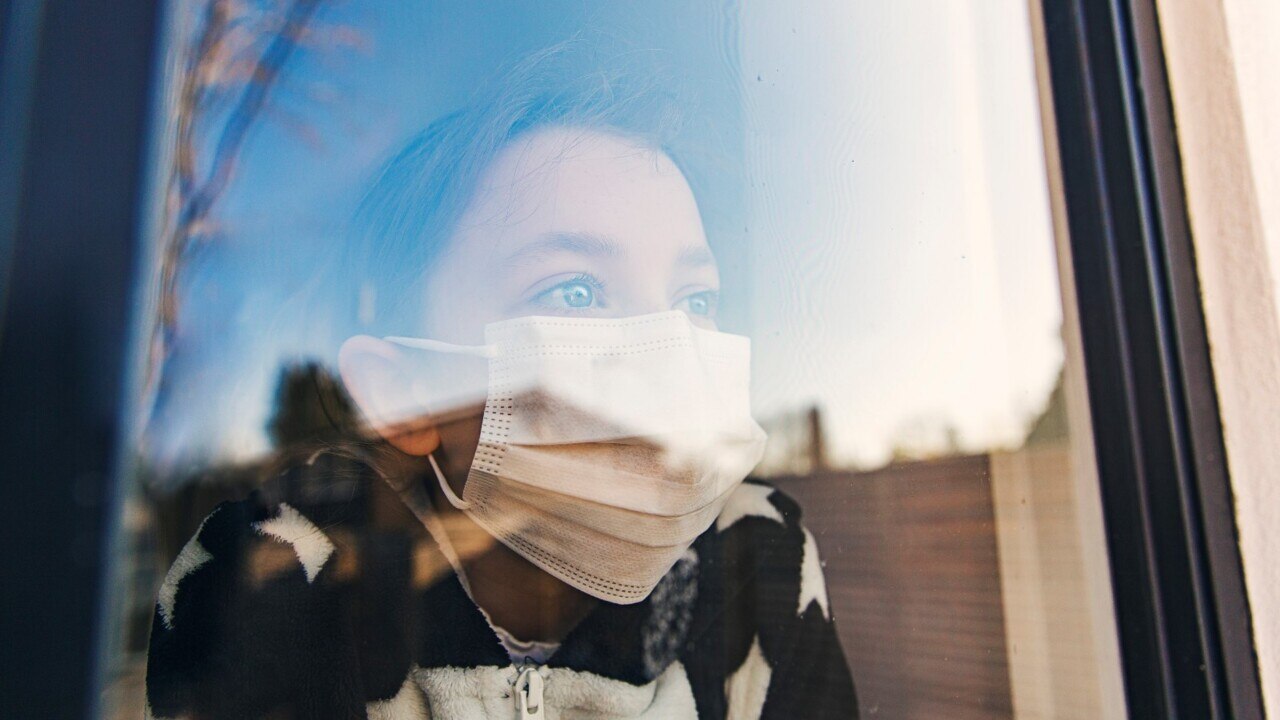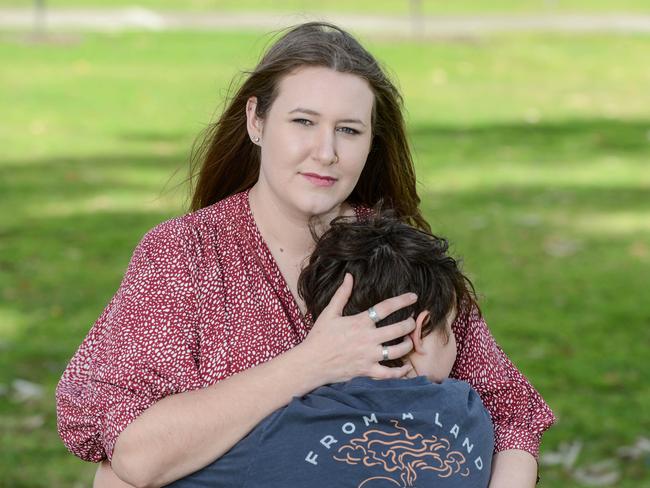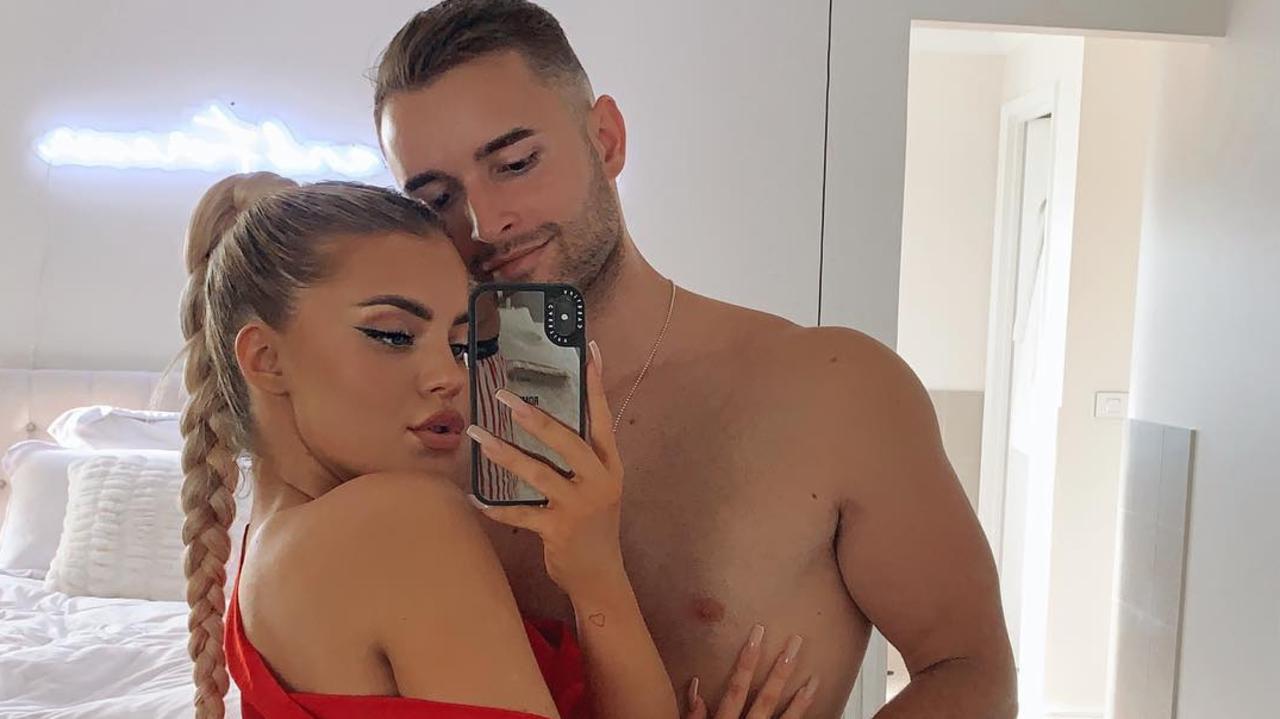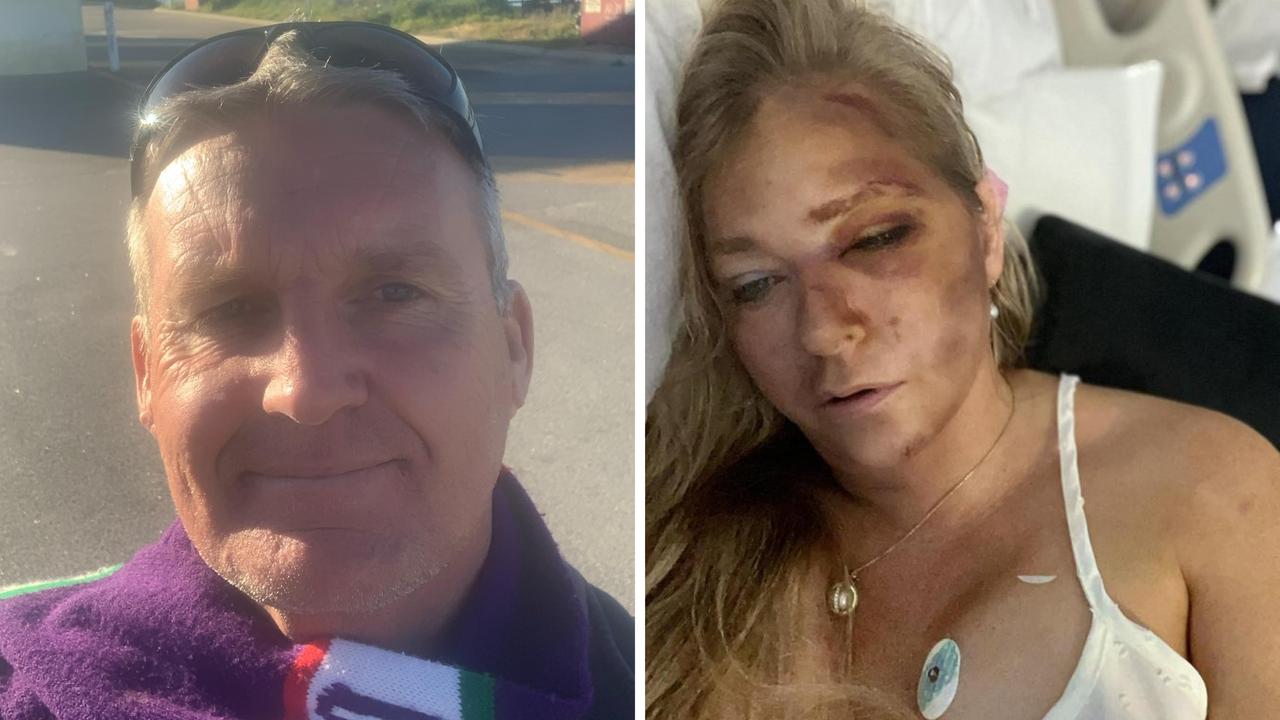Australian kids not getting help as children’s mental health crisis leaves parents in need
Some parents are living in fear of their kids because they can’t get access to mental health services that are at crisis levels. Warning: Graphic content

National
Don't miss out on the headlines from National. Followed categories will be added to My News.
Ruby was cooking dinner at the stove, when out of the corner of her eye, she spotted someone coming up behind her.
As she turned, she saw a knife in her 14-year-old daughter Tara’s hand.
Then she felt the blade slice across her neck.
“There were no warning signs,” Ruby, 49, says.
“She could have killed me.”
The cut was four cm long, but not life threatening.
“I did not go to the hospital because I thought she would get arrested if I did.
“I wiped away the blood and finished cooking dinner.”
Ruby and her husband Dan, from country Victoria, are in fear of their safety, living with a child with complex mental health issues.
Their other daughter stays mainly in her bedroom, which has a lock for protection.

Tara has been diagnosed with low mental IQ, anxiety, conduct disorder, PTSD and possible psychosis. She also has autism and ADHD and has suffered from hallucinations and hearing voices. She has also tried to harm herself.
She’s on a shopping list of medications including antipsychotics and mood stabilisers.
And, she is so difficult to manage, the National Disability Insurance Scheme is funding two daily support workers, plus therapy, adding up to nearly half a million dollars a year.
But however much money is being thrown at her, what she most needs she can’t get – a good private psychiatrist.

Due to unprecedented demand, adolescent psychiatrists in Australia are almost impossible to find.
“One psychiatrist told me they had a waiting list until 2024,” Ruby says.
She can’t even get a referral to a psychiatric unit for further investigations, despite two psychiatrists, including a forensic psychiatrist, recommending that as a course of action.
So, dealing with Tara’s extreme needs and aggressive behaviour falls mainly on the shoulders of her parents. It is a living hell for the family.
But it is one that is being replicated around Australia.
A Queensland-based national mental health service yourtown has seen a dramatic increase in the number of children calling its 24/7 counselling service Kids Help Line, in part because they can’t find a counsellor or psychologist.
The callers are also getting younger and their mental health needs more severe.
“We are really seeing a change in profile, with the number of young people in crisis increasing,” CEO of yourtown Tracy Adams says.

Murdoch Children’s Research Institute Professor Harriet Hiscock, who has investigated youth mental health gaps, says one study found that half of those adolescents meeting criteria for mental health conditions receive “sub-optimal management or do not access treatment at all” and the problem is systemic.
“Some children will get better, but there is a group that will continue to have mental health issues,” Prof Hiscock says.
“If they are getting services, they are not getting enough or the right types of support they need.”
This gap in help is leading to a flood of young people taking their own lives and harming and sometimes killing others, according to former supreme court judge Greg James QC and NSW Mental Health Review Tribunal former president.
“Treatment and facilities are shown to have been capable of helping but unfortunately, very few of the hospitals have the resources to deal with it,” Mr James says.

He has decided to speak out after hearing the tragic and troubled story of Josh Gill, 14, from Sydney, who was addicted to alcohol and sniffing aerosol cans and was also struggling with his mental health. He was never violent to others, only a danger to himself.
He died alone, trapped in the back seat of a stationary car which caught alight. What happened is yet to be determined by the coroner.
But what his parents Andrew and Diana can say is that they appealed to medical staff and anyone that would listen for help in the months leading up to his death. He was turned away from facilities without an explanation.
Just days before the tragedy, he was admitted to hospital after smashing his head into a police cell wall until he was unconscious. He was discharged hours later and his parents were not informed of the incident until later.

“Andrew’s family experienced their tragedy when their son was turned away from a hospital with limited facilities,” Mr James says.
“Not only that, they’re hard to treat these teenagers, especially teenagers with problems.
“They’re scary. They’re the size of adults, they’re as violent as adults, particularly when suffering floridly from mental health conditions.
“The hospital staff see themselves at risk.”
He says children with complex needs are being “excluded from treatment and you end up with suicide, sometimes fatal injuries inflicted on others”.
Mr James says the police and the emergency services are often the ones left to pick up the pieces.

In Adelaide Mahalah O’Malley’s 11-year-old boy has attempted to stab her, punched her in the head so repetitively a CAT scan was required, bitten her chest and arms, and attempted to pour boiling water over her.
He’s attacked his teachers, classmates and random people.
He’s been excluded from several schools.
He’s also threatened suicide multiple times.
After holding a serrated bread knife to his throat and threatening to kill himself, emergency services rushed to the scene.
It took three hours to talk him down.
Following the incident, he was taken to the emergency department, but within 25 minutes his mum says she got a call to collect him because he was ready to be discharged.

“How is that appropriate treatment?” Ms O’Malley, 28 and a single mum, says.
Ms O’Malley says one of the barriers to getting help is that her boy has autism and there doesn’t appear to be mental health support services for kids who also have a disability, which is why he ends up in the emergency department.
A recent report from Suicide Prevention Australia found 10,000 children attend emergency departments each year in Australia, due to self harm or mental distress, but they are not equipped to help them.
Ms O’Malley is part of a campaign group called Parents for Change, which is trying to improve the response to the mental health needs of kids.
The parents want to see emergency department staff better trained and “soft entrances” created, so vulnerable people don’t have to sit in a busy waiting room with everyone else, where there’s little privacy.
Ms O’Malley says her son trashed one hospital room after he was admitted and staff had to remove everything apart from the mattress.

His behaviour was not enough to get him the help he needed.
She says he has pathological demand avoidance, conduct disorder, autism and ADHD.
He can react violently to a simple request such as, “Can you come and eat dinner?”.
His mum says he needs psychology, occupational therapy and a behaviour support specialist, at a minimum.
She also believes he needs two support workers during waking hours, as well as the support worker he is currently given during the night, and wants authorities to find him a school that will accept him for more than one and a half hours per day.
She also says she needs to be taught safe restraint and self defence techniques for her own protection.

She says she doesn’t get enough NDIS funding to provide the amount of support he needs, despite having taken the NDIS to the Administrative Appeals Tribunal.
“The school needs to be a secure environment because he absconds,” Ms O’Malley says.
“If these kids don’t get an education, what’s their only other option? Jail?
“We can’t give up on them.”
For Ms O’Malley it is a race against time to get her son help.
A neurological psychologist told her if her son can get proper treatment for conduct disorder before the age of 14, it could make a real difference.
“If he’s calm; he’s lovely,” his mum says.
“He’s charming, he’s intelligent and polite. He could be a mechanical engineer.”
Meanwhile, back in Victoria, the NDIS is paying out more than $460,000 a year to help fund two carers to look after Tara during the day, along with some treatments.
They also insist Tara’s mother or father are in attendance in case things escalate, so effectively three-to-one care.

Tara, now aged 15 and 95 kilos due to weight gain from her medication, loves her mother, but tends to direct her aggression towards her more than anyone else.
For this reason Ruby tries never to be alone with her own daughter.
On one occasion she was and Tara took the opportunity to punch her for 15 minutes straight – only stopping once to catch her breath.
When her mother managed to take control by sitting on top of her and holding her arms down, Tara bit them, leaving nasty black and blue welts which lasted for weeks.
That time police were called.
In the past Tara’s also attempted to gouge her parents’ eyes out.
She’s pulled at the wheel of their car while they’ve been driving, bashed through the bedroom wall to try and attack her sister, and punched a nurse and kicked a security guard at a hospital.

She’s also escaped the family home multiple times during the night – on one occasion badly scarring her back on a window bolt – and punched neighbours who have tried to help her. The family now have alarms on the doors to stop her escaping.
She has had 15 charges laid against her, but when the courts hear of her mental health situation, they inevitably get dropped.
She is also a danger to herself.
In one incident Tara swallowed eight batteries and needed two operations.
Her parents had to collect her from the hospital on the night of the second operation because she attacked the nurse.
She also consumed coins and a 300ml bottle of hand sanitiser, laid down in the road, tried to throw herself out of a moving car and punched and hit herself.
In one two-month period, the ambulance took her to hospital more than 50 times, each time she was handcuffed for everyone’s safety.
Her parents say they desperately need respite care for their own mental health, but authorities have been unable to help.

In another state, another family is also in turmoil, fearing that at any moment they will get a knock on the door from police to tell them their 17-year-old is dead.
Her parents – who don’t want to be named to protect their daughter – are trying to find out who is accountable for her health and housing needs.
Their former A grade student daughter, who stopped attending school due to bullying, has bipolar affective, PTSD, depression, bulimia and anxiety.
She also has a serious drug addiction.
She has had multiple stints in mental health wards and was last month admitted to rehab, but although she was an inpatient she was able to sign herself out.
Her latest hospital admission was for her drug addictions. She spent the first week withdrawing and sleeping. Once she had detoxed, she was initially given leave for two hours each day. She had not even completed a full week of the program before she was given leave for six hours on the weekend which was her downfall.

On one occasion when she returned “high on drugs”, her father says she was kicked off the program.
With a police AVO preventing her returning to the family home due to her volatility related to drug use, and with few options being offered by the Department of Communities and Justice, the vulnerable teen is living on the streets.
Her father has been frantically writing emails to everyone from the Prime Minister to the Attorney-General and Health Minister Mark Butler, as well as the Human Rights Commission to find out who is responsible for ensuring his daughter gets the appropriate treatment and housing support.
He believes there should be a Royal Commission into the mental health provision for youths in Australia.
He says he’s asked the Human Rights Commission to investigate why his daughter, as a non-indigenous child, is not getting the same treatment as an indigenous girl, who was involuntarily sent to rehab by a Supreme Court judge who authorised the “hospital staff to detain her, using reasonable force if necessary”.

The Sydney girl’s father says when he asks why his child can’t be detained without her consent, “everyone just passes the buck”.
“This has been ongoing for nearly four years,” he says.
“She is a child with chronic, life threatening medical and mental health conditions and is living on the streets.
“I feel we are coming to the end now, she is going to wind up dead.
“This is Australia for Christ’s sake. How can this be allowed?”
He says the system has totally and utterly failed his daughter who has attended hospital more than 40 times and has tried to take her life six times.
Involuntary drug and alcohol rehabilitation facilities for adolescents is something Josh Gill’s parents want the coroner to explore when determining their son’s cause of death.
They believe his death could have been prevented if he had received the right treatment.
A spokeswoman for the Department of Communities and Justice (DCJ) in NSW says it is committed to the safety and wellbeing of children and young people.
But it is unable to comment on this girl’s case for privacy reasons.
In general, involuntary admissions to mental health units are subject to individual state and territory legislation which set out strict criteria that must be met in order for someone to be admitted to hospital as an involuntary patient.

A federal health spokesman said young Australians can access free or low-cost mental health support from either the national network of 150 headspace services or online at eheadspace and that the Government has recently announced $44 million for 57 headspace centres across the country, to reduce wait times and improve services for young people in need.
Meanwhile, an National Disability Insurance Agency (NDIA) spokesman says the priority remains ensuring participants and their families receive the disability-related supports they need.
“The NDIA and the Australian Government recognises the stress many families face in ensuring their child receives the appropriate care and support,” he says.
“This can be especially difficult for families where children display challenging behaviours.”
“Where appropriate, the Agency may provide funding in a participant’s plan for short-term accommodation (respite), to allow family members a short break from their caring responsibilities.”
However, Tara’s parents have not been able to access respite care.
They allege medical staff have suggested they relinquish Tara to authorities or let police put her in jail.
Last year 48 families in Victoria did hand over their children due to violence.
Despite everything, Ruby says she could never give up her child and will never stop fighting for her.
“I love her to bits. I would do anything for her,” Ruby says.
“I tell her I love her and I will never give up on her.”
*Ruby, Tara and Dan are not their real names.
For help with emotional difficulties, contact Lifeline on 13 11 14 or www.lifeline.org.au or call the Kids Helpline on 1800 55 1800
More Coverage
Originally published as Australian kids not getting help as children’s mental health crisis leaves parents in need





